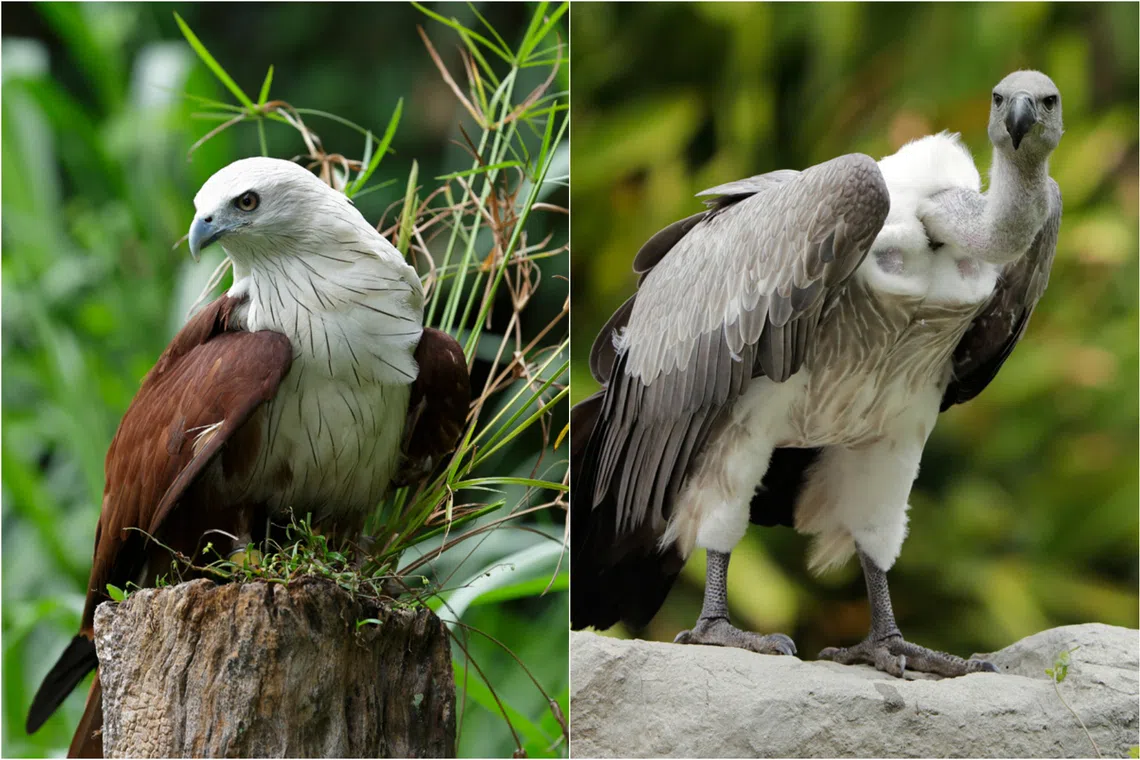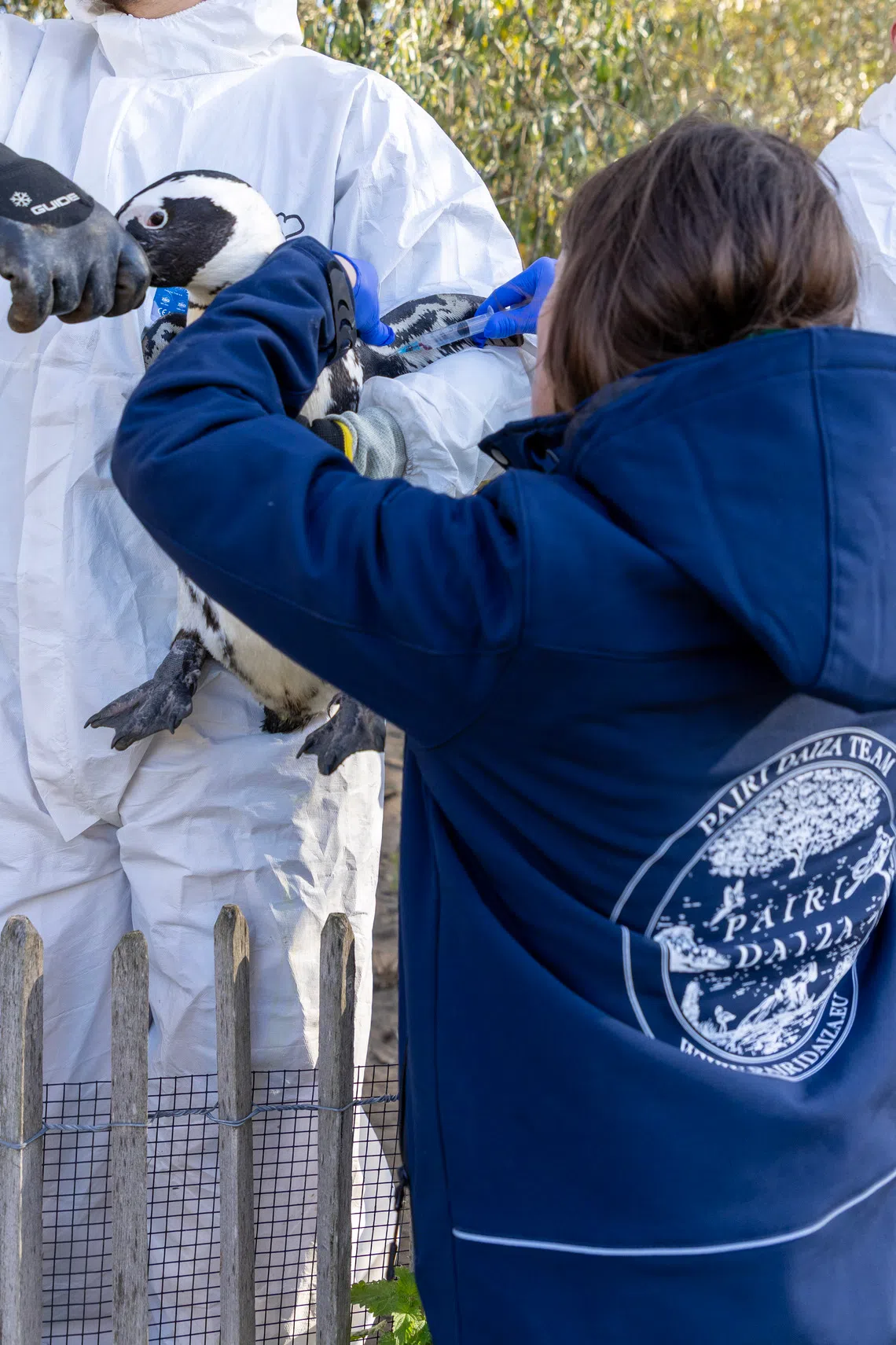Some birds in Mandai Wildlife Reserve to be vaccinated against deadly bird flu in pilot
Sign up now: Get ST's newsletters delivered to your inbox

The brahminy kite (left) and the critically endangered white-backed vulture could be among the bird species to be vaccinated.
PHOTOS: MANDAI WILDLIFE GROUP
Follow topic:
SINGAPORE – From 2026, some birds in Mandai Wildlife Reserve’s parks will be vaccinated against bird flu as part of a pilot initiative to prevent the spread of the contagious disease in the Republic.
While Singapore has remained free of avian influenza, the virus is present in many parts of the world and continues to spread globally, underscoring the need for vigilance, said the National Parks Board (NParks), Mandai Wildlife Group and a French animal health company providing the vaccine on Nov 20.
Moreover, Singapore is a hot spot for migratory birds, which may carry the H5 avian influenza, a deadly virus that has wiped out numerous poultry farms in Europe and even spread to mammals like cows in the US and elephant seals on an island near Antarctica
While the occurrences are low, humans have also been infected with the deadly bird flu. According to the US Centers for Disease Control and Prevention, the H5 avian influenza has infected 71 people in the US
Birds of prey and threatened species in the Mandai zoological parks could be among the feathered animals that will receive the mRNA vaccine, made by French company Ceva Animal Health, from 2026.
Among the species that may be included are the brahminy kite, a type of eagle, the critically endangered white-backed vulture and the marbled duck.
On Nov 19, NParks, Mandai Wildlife Group, Ceva, and endowment fund Ceva Wildlife Research Fund inked an agreement to jointly conduct the vaccination pilot.
The pilot will likely take at least a year, and more information will be shared when available, said NParks and Mandai Wildlife Group.
The programme may begin with a small, selected group of species, potentially up to 10. Mandai Wildlife Group and NParks will closely monitor the results and, based on their findings, will evaluate the possibility of expanding the programme to additional species over time.
“The primary goal is not to vaccinate a specific number of birds, but rather to enhance protection against highly pathogenic avian influenza across as many bird species as possible,” they added.
This pilot is also not the first time a bird flu vaccine will be administered in the zoological parks here. Mandai Wildlife Group has an established vaccination programme for the birds in its care as part of preventive health measures, particularly for those at higher risk of exposure to wild birds.
“This new programme will apply Ceva’s latest generation vaccine for enhanced effectiveness, as well as extend its use to a wider range of bird species,” said Mandai.
Dr Pierre-Marie Borne, director of the Ceva Wildlife Research Fund, noted that birds of prey are more susceptible to avian influenza, but scientists have not yet identified the reasons. Wild birds such as pelicans and penguins have also been found to be more susceptible, in addition to birds of prey.
Bird flu occurs naturally among wild aquatic birds like ducks and geese, and shorebirds like plovers and sandpipers. They can easily infect poultry like chickens through direct contact or contact with contaminated surfaces.
Infected birds show symptoms such as reduced energy, swelling of body parts, coughing, sneezing and diarrhoea. In poultry, the more contagious H5 strain usually causes severe illness, and few birds in infected flocks survive.
Ceva’s mRNA vaccine – similar to the technology behind some Covid-19 vaccines – sends cells a genetic instruction that induces an immune response. A substance is produced, prompting the immune system to create protective antibodies. These then prevent the virus from infecting the birds.
The vaccine targets an avian influenza strain that is currently circulating and it can be used across a range of bird species, said Ceva’s chief executive Marc Prikazsky.
Just a small amount of vaccine, 0.2ml, is sufficient to trigger a strong immune response, he told The Straits Times.
The pilot will generate insights into the vaccine’s antibody response, duration of protection and effectiveness across bird species in protecting them from avian influenza.
The Ceva Wildlife Research Fund will lead the scientific and logistical aspects of the programme, while Ceva will provide the vaccines free of charge.

Vaccination being carried out at Pairi Daiza (Belgian zoo) with Ceva Wildlife Research Fund.
PHOTO: PAIRI DAIZA
NParks will coordinate the vaccination programme and help with testing and reviewing the results. Mandai Wildlife Group will monitor the birds involved and ensure their welfare throughout the process.
“With the diversity of species in our care, we can provide unique insights into the vaccine’s performance and boost knowledge that can help shape conservation and health strategies locally and globally,” said Mr Bennett Neo, group chief executive of Mandai Wildlife Group.
Explaining the need for vaccination in a zoo setting, Dr Prikazsky said: “In open or semi-open exhibits, it is impossible to completely exclude contact with wild waterbirds.
“That means the (virus) introduction risk is low but very high-impact, especially for collections that include threatened parrots, hornbills, cranes or penguins that are part of global breeding programmes.”
When asked if poultry on Singapore farms are required to be vaccinated against avian influenza, NParks’ Animal and Veterinary Service and the Singapore Food Agency told ST that farms here are now allowed to vaccinate their poultry, subject to farm biosurveillance and biosecurity measures.
This decision was made following a review by both agencies.
When asked if wild birds like pigeons, chickens and mynahs could be vaccinated in Singapore, Dr Prikazsky said it is not feasible as vaccinations involve manual work and close tracking of the birds’ immunity and responses.
He added that it is more important to vaccinate birds that are in closer proximity to one another, and with humans, in hot spots like farms and zoos. Wild birds that get infected are often found close to a farm or hot spot that has had an outbreak.
NParks added that vaccination is one tool to enhance the protection of resident birds against the virus, and its usefulness in other bird populations will need to be assessed for its effectiveness and practicality.
“Other equally important measures include good biosecurity and husbandry practices,” said the agency.


